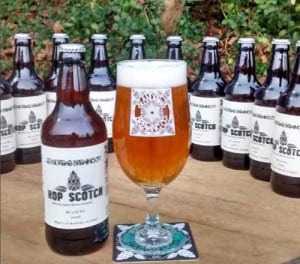
In a brewery store in St Andrews sits a very special test batch of beer. The 400 or so bottles can’t be sold to the public – but they are the very beginnings of the first wet hop beer to be commercially made using fresh hops grown in Scotland.
Notoriously difficult to grow in cooler climates, brewers in Scotland bring in their hops from the south of England where the tough, wayward plant thrives in the long summer days.
Seaweed, berries and heather are used by Scottish brewers to achieve the same citrus-style bitterness created by the flowers.
But wet hop beer made entirely in Scotland is on the horizon following an experiment by scientists at the James Hutton Institute which led to a rare full crop being harvested in Invergowrie, near Dundee, this autumn.
The test led to the creation of wet hop beer called Hop Scotch at the St Andrews Brewery Company, with the small firm delighted with the results of the 4.6 per cent brew.
Brewer Simon Tardivel said he had been “excited” by the result of the growing experiment.
“The trial we did with the hops went really well,” Mr Tardivel said.
“I was really excited about it. I come from Kent where there are a lot of green hop beers and I never thought we would be able to do one in Scotland.
“But the hops that we got turned into a really nice, refreshing pale ale. We have got other beers where the malt comes from Scotland and the yeast is reused from batch to batch so I would say that was Scottish. The water is, of course, from Scotland. The only other ingredient is the hops.”
Mr Tardivel said kiln dried hops were commonly used by brewers to allow them to make beer all year round.
Normally, once a year beer can be made with fresh hops straight from the farm which gives a “noticeably different character”, he added.
“It is like the difference between using fresh and dried herbs in your cooking,” he said.
However, breweries in Scotland have struggled to get their hands on the English hops in time as the crop starts composting very quickly after harvest.
Mr Tardivel said: “We never thought that we’d be able to make a wet hop beer in Scotland due to the fact that most UK hops are grown in the south of England and it would be logistically very difficult to get fresh hops shipped up in time to brew.
“However, thanks to the work of the James Hutton Institute, we were able to brew this year with hops grown just down the road. Though we can’t sell this year’s beer, we are looking forward to working with them again next year to make a commercial batch.”
Because the pesticides used on the trial crop aren’t registered for use on hops, the beer cannot be sampled by the public.
When the perennial crop flowers again in spring, it is hoped that refinements to the growing process can be made to improve pest control, quality and yield with a view to harvesting greater amounts of hops next autumn to deliver to the brewery.
Dr Rex Brennan, leader of the soft fruit breeding group at the James Hutton Institute, said growing hops in Scotland had been a “steep learning curve”.
While they have been grown as far north as Aberdeen in the past, they remain a rare crop north of the Border, he said.
The crop was produced following an idea by Professor Robbie Waugh from the institute’s Cell and Molecular Sciences group with the right growing conditions devised by Euan Caldwell, head of farms, field and glasshouse services. Dr Brennan said: “Next year, we will have much more material going to brewers and we will really get a handle of the quality of the crop.”


Hop Scotch ale uses fresh hops produced in Invergowrie near Dundee under the supervision of the James Hutton Institute team. Picture: TSPL
The hop industry and hop brewers in the south of England had given the James Hutton team a lot of help with the growing experiment, Dr Brennan said. Dr Brennan described hops as “very vigorous crops” which needed to be trained on strings, which was difficult to get right under polytunnels.
“They are amazing plants, just the vigour and the productivity is really quite splendid. Everyone is interested in local provenance now, not just the food we eat but the raw materials. If things can be grown here, it can make a valuable contribution to an emerging industry. Our role is to develop the idea and see if it is something that is going to be commercially successful.
“So far we have only done very small tests. Next year is when things will really happen.”